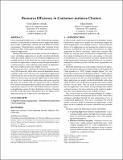Files in this item
Resource efficiency in container-instance clusters
Item metadata
| dc.contributor.author | Awada, Uchechukwu | |
| dc.contributor.author | Barker, Adam David | |
| dc.date.accessioned | 2017-04-26T09:30:13Z | |
| dc.date.available | 2017-04-26T09:30:13Z | |
| dc.date.issued | 2017-03-22 | |
| dc.identifier | 249721431 | |
| dc.identifier | 483a4791-a605-4731-96bc-f40ff72ae207 | |
| dc.identifier | 85027437816 | |
| dc.identifier | 000694010100166 | |
| dc.identifier.citation | Awada , U & Barker , A D 2017 , Resource efficiency in container-instance clusters . in Second International Conference on Internet of Things, Data and Cloud Computing (ICC 2017) . ACM , 2nd International Conference on Internet of Things, Data and Cloud Computing (ICC 2017) , Cambridge , United Kingdom , 22/03/17 . https://doi.org/10.1145/3018896.3056798 | en |
| dc.identifier.citation | conference | en |
| dc.identifier.isbn | 9781450347747 | |
| dc.identifier.uri | https://hdl.handle.net/10023/10659 | |
| dc.description | This research is supported by the Amazon Web Services (AWS) Education Research Grant. | en |
| dc.description.abstract | Cloud computing providers have recently begun offering container instances, which provide an efficient route to application deployment within a lightweight, isolated and well-defined execution environment. Cloud providers currently offer Container Service Platforms (CSPs), which support the flexible orchestration of containerised applications. Existing CSP frameworks do not offer any form of intelligent resource scheduling: applications are usually scheduled individually,rather than taking a holistic view of all registered applications and available resources in the cloud. This can result in increased execution times for applications, resource wastage through underutilized container-instances, and a reduction in the number of applications that can be deployed, given the available resources. This paper presents a cloud-based Container Management Service(CMS) framework, which offers increased deployment density, scalability and resource efficiency for containerised applications. CMS extends the state-of-the-art by providing additional functionalities for orchestrating containerised applications by joint optimisation of sets of containerised applications and resource pool on the cloud. We evaluate CMS on a cloud-based CSP i.e., Amazon EC2 Container Management Service (ECS) and conducted extensive experiments using sets of CPU and Memory intensive containerised applications against the direct deployment strategy of Amazon ECS. The results show that CMS achieves up to 25% higher cluster utilisation and up to 2.5 times faster execution times. | |
| dc.format.extent | 1144504 | |
| dc.language.iso | eng | |
| dc.publisher | ACM | |
| dc.relation.ispartof | Second International Conference on Internet of Things, Data and Cloud Computing (ICC 2017) | en |
| dc.subject | Application container | en |
| dc.subject | Cloud computing | en |
| dc.subject | Resource efficiency | en |
| dc.subject | Execution time | en |
| dc.subject | QA75 Electronic computers. Computer science | en |
| dc.subject | QA76 Computer software | en |
| dc.subject | T Technology | en |
| dc.subject | NDAS | en |
| dc.subject | SDG 8 - Decent Work and Economic Growth | en |
| dc.subject | SDG 12 - Responsible Consumption and Production | en |
| dc.subject.lcc | QA75 | en |
| dc.subject.lcc | QA76 | en |
| dc.subject.lcc | T | en |
| dc.title | Resource efficiency in container-instance clusters | en |
| dc.type | Conference item | en |
| dc.contributor.institution | University of St Andrews. School of Computer Science | en |
| dc.identifier.doi | 10.1145/3018896.3056798 |
This item appears in the following Collection(s)
Items in the St Andrews Research Repository are protected by copyright, with all rights reserved, unless otherwise indicated.

